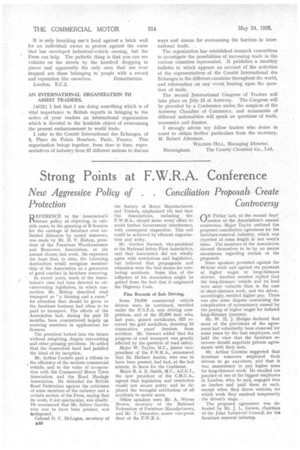Strong Points at F.W.R.A. Conference
Page 58

If you've noticed an error in this article please click here to report it so we can fix it.
New Aggressive Policy of . . Conciliation Proposals Create Protection
REFERENCE to the Association's future policy of objecting, in uitable cases, to the granting of B licences for the carriage of furniture over unlimited distances by casual removers, was made by Mr. H. V. Bishop, president of the Furniture Warehousemen and Removers Association, at the annual dinner, last week. He expressed the hope that, in time, the Licensing Authorities would recognize membership of the Association as a guarantee of good conduct in furniture removing.
In recent years, much of the Association's time had been devoted to circumventing legislation, in which connection Mr. Bishop described road transport as "a blessing and a curse." for attention that should be given to the furniture business had often to be paid to transport. The efforts of the Association had, during the past 12 months, been concentrated largely on assisting members in applications for licences.
The president looked into the future without misgiving, despite rate-cutting and other pressing problems. He added that the benevolent fund had justified the ideal of its inception.
Mr. Arthur Coombe paid a tribute to the efficiency of the modern commercial vehicle, and to the value of co-operation with the Commercial Motor Users Association and the Road Haulage Association. He defended the British Road Federation against the criticisms of some members of the industry and a certain section of the Press, saying that its work, if not spectacular, was steady. He announced that Mr. Sidney Garcke, who was to have been present, was indisposed.
Colonel D. C. McLagan, secretary of 840 the Society of Motor Manufacturers and Traders, emphasized the fact that the Associations, including the F.W.R.A., should make every effort to avoid further Government interference, with consequent stagnation. This end could be achieved by efficient organization and unity.
Mr. Gordon Stewart, vice-president of the National Safety First Association, said that Association did not wholly agree with restrictions and legislation, but believed that propaganda and education were the best means for combating accidents. Some idea of the influence of his Association might be gained from the fact that it originated the Highway Code.
Fine Records of Safe Driving.
Some 70,000 commercial vehicle drivers were, he continued, enrolled under the N.S.F.A. safe driving competition, and of the 27,000 men who, last year, gained certificates, 523 received the gold medallion, denoting 10 consecutive years' freedom from accident. Mr. Stewart added that the progress of road transport was greatly affected by the question of road safety.
Major W. Taylor, M.C., junior vicepresident of the F.W.R.A., announced that Sir Herbert Austin, who was to have been present, had had, at the last minute, to leave for the Continent.
Major R. A. B. Smith, MC., A.C.G.I., the new president of the C.M.U.A., agreed that legislation and restriction would not secure safety and he deplored the wrongful attribution of all accidents to motor users.
Other speakers were Mr. A. •Warne Brown,' secretary of the National Federation of Furniture Manufacturers, and Mr. T. Ormesher, senior vice-president of the F.W.R.A.
Controversy
rIN Friday last, at the second days' L./session of the Association's annual conference, Major Taylor outlined the proposed conciliation agreement for the furniture-removal industry, which was reported at some length in last week's issue. The members of the Association showed themselves to be by no means unanimous regarding certain of the proposals.
Some speakers protested against the 48-hour week and against the payment of higher wages to long-distance drivers. Another member replied that the long-distance vehicle and its load were more valuable than in the case • of short-distance work, and the driver, accordingly, merited higher pay. There was also some dispute concerning the complication of accountancy caused by the paying of higher wages for isolated long-distance journeys.
Mr. W. H. J. Hedges declared that most of the provisions of the agreement had voluntarily been observed for some years by the best employers, and held the view that the furniture removers should negotiate private agreements. with their men.
Mr. Arthur Coombe suggested that furniture removers employed their drivers to go anywhere, and that it was unnecessary to pay higher rates for long-distance work. He recalled the practice of one of the biggest employers in London, who, he said, engaged men as loaders and paid them as such, except when they drove vehicles, for which work they received temporarily • the driver's wage.
The proposed agreement was defended by Mr. J. L. Gerson, chairman of the Joint Industrial Council, for the furniture removal industry.




































































































